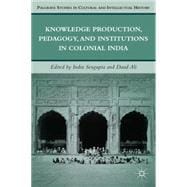
What is included with this book?
PART I: PRODUCING COLONIAL KNOWLEDGE * What’s in a (Proper) Name? Particulars, Individuals and Authorship in the Linguistic Survey of India and Colonial Scholarship – Javed Majeed * The Floating Lexicon: Hobson-Jobson and the OED – Kate Teltscher * Missions and Museums: Hindu Gods and Other “Abominations,” 1820-1860 – Geoffrey Oddie * Antiquarian Knowledge and Preservation of Indian Monuments at the Turn of the Nineteenth Century – Ann Julie Etter * PART II: HISTORICAL PLACES, HISTORICAL PASTS * Landscapes of the Past: Rajatarangini and Historical Knowledge Production in Late-Nineteenth-Century Kashmir – Chitralekha Zutshi * Jaunpur, Ruination, and Conservation during the Colonial Era – Michael Dodson * The Qutb Minar in Sayyid Ahmad Khan’s Asar us-?anadid – David Lelyveld * PART III: PEDAGOGY AND TRANSFORMATION * Promoting Scientism: Institutions for Gathering and Disseminating Knowledge in British Bihar – Peter Gottschalk * Old Books in New Bindings: Ethics and Education in Colonial India – Avril Powell * Teaching Emotions. Victorian Values and Sharafat in Nineteenth-century Delhi – Margrit Pernau
The New copy of this book will include any supplemental materials advertised. Please check the title of the book to determine if it should include any access cards, study guides, lab manuals, CDs, etc.
The Used, Rental and eBook copies of this book are not guaranteed to include any supplemental materials. Typically, only the book itself is included. This is true even if the title states it includes any access cards, study guides, lab manuals, CDs, etc.